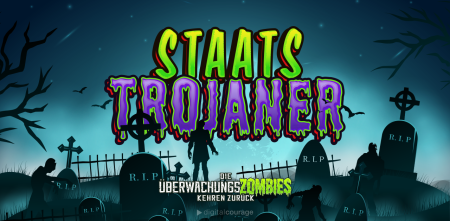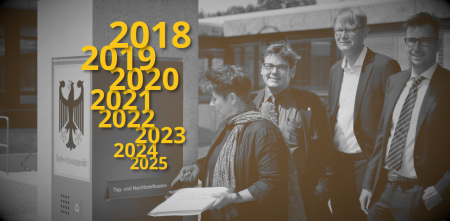Nothing to hide?
1. It is false
Or why do you close the bathroom door behind you?
2. It is stupid
For it ignores the connection between freedom, secrets and power dynamics: Somebody who knows everything about us can easily blackmail us, or impersonate us (identity theft).
3. It is backward
What is socially accepted today could cause you trouble tomorrow. Or would you have thought twenty years ago that your health insurance company could make your premiums dependent on your eating habits?
4. It forgets history
For it disregards the consequences of radical changes of government. German history in particular shows that information collected on the population will develop a horrifying potential for abuse in the hands of radical regimes.
5. It is illogical
It implies: If you have something to hide, you have done something wrong, which you now have to hide. That is a very common logical fallacy (confusion of the inverse): Although criminal activity is hidden, that does not mean that everything that is hidden is also criminal.
Translation: Katharina M. Klimm, Sebastian Lisken
Unterstützen Sie die gute Sache: Freiheit, Grundrechte und Demokratie.
Viele Menschen engagieren sich bei uns in ihrer Freizeit, seien auch Sie dabei!
Bleiben Sie auf dem Laufenden über unsere Arbeit und unsere Themen.
6. It stigmatises
For it conveys that you have to subject yourself to a norm to be tolerated. Anyone who does “weird” things in bed, smokes hashish or has a love affair, is lumped together with criminals.
7. It displays a lack of solidarity
The more people believe that they have nothing to hide, the more suspicious it becomes to have secrets in the first place.
8. It is naïve
A single piece of information like your date of birth or your hobby may be harmless. But based on large amounts of such pieces of data (“big data”), companies already construct profiles to predict and manipulate your behaviour. The potential for abuse (for example by marriage impostors, stalkers or sexual assailants) and identity theft is grossly underestimated.
9. It obstructs resistance
Those who disclose their whole lives, making themselves susceptible to blackmail and manipulation, will subsequently find it much harder to defend against undemocratic or inhumane authorities.
10. It is ignorant
Secrets – as not only pubescent teenagers know – are crucial for shaping our identity. To exercise our many different roles in everyday life, we particularly have to be able to self-determine who knows what about us. Or do you want your boss to know that you had to see the doctor for a fungal infection?
11. It is anti-democratic
Without secrets, there can be no free formation of opinion, which is a fundamental prerequisite for free elections. Polling booths exist for a reason. Those who cannot conceal their voting behaviour can be blackmailed and manipulated.
These arguments on paper
You can obtain these arguments as a flyer in our shop or as a PDF file for self-printing from our shop. (Links are for the German original, the English version will follow.)
Ähnliche Artikel
Staatstrojaner
Bild: Waldemar (Unsplash) (Foto) und Melanie Lübbert (Grafik), CC-BY 4.0
Medienberichte zur Staatstrojaner-Entscheidung
Bild: Mischa Burmester (Foto), Montage: Melanie Lübbert






